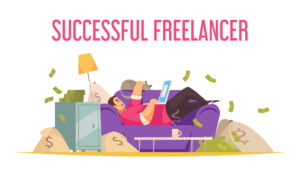As freelancing evolves, autonomy meets uncertainty, creating a unique blend of liberation and challenges. This dynamic environment requires a strategic approach based on proactive and prudent choices. Freelancers balance financial rewards and personal fulfillment with risks. This detailed guide covers the dos and don’ts of freelancing success. From role expansion to avoiding pitfalls, each aspect is explored to help freelancers thrive amidst the complexities and ensure a healthier, happier, and more successful freelance career.
Dos For A Successful Freelancing Career
Offer To Expand And Provide Suggestions
Freelancers suggest improvements to improve your work. Be bold in expressing your ideas for improvements or additional work if you see them. Since freelancers shouldn’t lie about their skills, price your suggestions accordingly. By being proactive, you add value to the project and become indispensable to your clients. To stand out in the freelance world, demonstrate your ability to think beyond the task.
Beware Of Scope-creep
Success in freelancing requires clarity and transparency. Clarify project expectations from the start. Avoid scope creep, which increases tasks without compensation. When requests like “Can you just…?” include a number and pound sign, acknowledge the extra work. Set boundaries early to protect your time and money. A clear scope prevents misunderstandings and builds a professional foundation for a healthier and more successful freelancing relationship.
Quote And Charge Realistically
Freelancers must weigh many factors to determine their value. Consider project duration, client-uncovered costs, and expertise. Freelancers pay for their workspace, equipment, utilities, services, insurance, and memberships. Work often takes longer than expected when quoting, so your initial figure may need adjustment. Realistic pricing ensures fair compensation and helps your freelancing career survive.
Focus On Your Work
Discipline is vital to freelancing success. Freelancers don’t get paid for unproductive days, unlike traditional workers. To avoid procrastination and distractions, use tools, timers, and software. Being disciplined ensures consistent productivity, essential for meeting deadlines and building trust. In the competitive freelancer market, those consistently producing high-quality work are likelier to succeed.
Get Insurance
Get freelancer insurance to protect your career. Work may require professional indemnity, public liability, or product liability insurance. Get the best deal by shopping around. Explore professional associations or business network specials. Consider insurance an investment in your professional security, protecting you from legal or financial issues while freelancing.
Consider Non-monetary Payment
Freelance work negotiations go beyond pay. Consider the value of perks, expense coverage, equipment, resources, access fees, and memberships. Adjusting your cost for benefits is fine, but avoid working for exposure. Exposure is a benefit, not a payment substitute. Combining financial and non-monetary bonuses boosts the value of your freelancing work and ensures your skills are valued.
Be Reliable
Freelancing requires dependability. Maintaining quality and meeting deadlines builds client trust. Reliability builds client-freelancer relationships and establishes you as a trustworthy professional. Making reliability a cornerstone of your freelancing approach increases repeat business and referrals, helping your career succeed.
Communicate Effectively
Communication is vital to freelancing success. Answer client inquiries quickly and professionally, updating them on your progress. Keep work emails relevant and avoid personal details. Clear, concise communication builds client trust and a good working relationship. Effective communication boosts your professional image and increases the likelihood of successful collaborations and long-term client partnerships.
Ask For Deposits Or Payment In Stages
Install a secure payment system to protect your freelance finances. These measures compensate you for your work through upfront deposits or project-based payments. Avoid full payment upon completion for larger projects, especially with new clients. Securing financial commitments at project milestones reduces the risk of non-payment and strengthens your freelancing career financially.
Market Yourself
Freelancers, market yourself to control your career. Create an appealing, user-friendly website that showcases your services and client testimonials. Use job boards and freelance marketplaces to reach more people. Make sure potential customers see your services in newspapers, trade publications, and social media by tailoring your marketing strategy to your industry. Don’t expect work to come to you; you must actively promote yourself to find diverse and rewarding freelance jobs.
Don’ts To Avoid Pitfalls In Freelancing
Do Not Work For Free
Exposure is tempting but avoid free work. Your time and skills are valuable, so exposure alone may not help your career. Establish a fair compensation standard to value your freelance work. Avoiding unpaid work establishes you as a professional who loves your job and ensures you are compensated.
Do Not Allow Clients To Take Advantage
Set client boundaries to maintain a healthy freelance relationship. While being helpful is essential, don’t be taken for granted. Regular or new clients who sense your joblessness may request urgent tasks or more work. Be flexible but charge more for critical functions that require rescheduling or overtime. Set and enforce boundaries to maintain a balanced and respectful relationship with clients.
Do Not Over-promise
While confidence is essential, overpromising can cause stress, exhaustion, and professional damage. Honesty about your abilities and not overcommitting are crucial. Balance demonstrating your skills with promising work that can be completed on time. By managing expectations, you ensure long-term freelancing success.
Do Not Lose Self-discipline
Freelancers enjoy your flexibility without sacrificing self-discipline. Take breaks and do chores, but remember the hours you need to make a living. Use technology to your advantage, but don’t procrastinate. Balance work and personal obligations, knowing that freelancing requires self-discipline to succeed.
Conclusion
Freelance success requires a delicate balance of proactive and vigilant dos and don’ts. Freelancing requires discipline and strategic decision-making to balance flexibility and freedom. By following these guidelines, freelancers can overcome obstacles, seize opportunities, and build a fulfilling and profitable career. Adaptability and self-discipline are essential to balance the freedom and responsibilities of freelancing.



